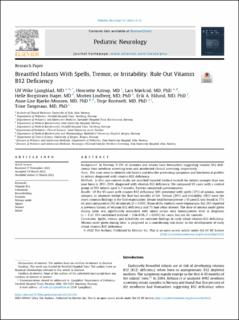Breastfed Infants With Spells, Tremor, or Irritability: Rule Out Vitamin B12 Deficiency
Ljungblad, Ulf Wike; Astrup, Henriette; Mørkrid, Lars; Hager, Helle Borgstrøm; Lindberg, Morten; Eklund, Erik A.; Monsen, Anne-Lise Bjørke; Rootwelt-Revheim, Terje; Tangeraas, Trine
Journal article, Peer reviewed
Published version

Åpne
Permanent lenke
https://hdl.handle.net/11250/3002717Utgivelsesdato
2022Metadata
Vis full innførselSamlinger
- Department of Clinical Science [2318]
- Registrations from Cristin [9791]
Sammendrag
Background: In Norway, 5-10% of neonates and infants have biomarkers suggesting vitamin B12 deficiency from newborn screening tests and unselected clinical screening, respectively.
Aims: The aims were to identify risk factors and describe presenting symptoms and biochemical profiles in infants diagnosed with vitamin B12 deficiency.
Methods: In this case-control study, we searched hospital medical records for infants younger than one year born in 2011-2018, diagnosed with vitamin B12 deficiency. We compared 85 cases with a control group of 252 infants aged 3-7 months. Parents completed questionnaires.
Results: Of the 85 cases with vitamin B12 deficiency, 80% presented with spells (37%) of apneas, motor seizures, or absences within the first two months of life. Tremor (29%) and irritability (18%) were the most common findings at the first examination. Serum total homocysteine ≥10 μmol/L was found in 77% of cases compared to 28% of controls (P < 0.001). None of the mothers were vegetarians, but 25% reported a previous history of vitamin B12 deficiency and 7% had celiac disease. The dose of nitrous oxide given during labor was significantly associated with infant serum total homocysteine level at diagnosis (r = 0.37, 95% confidence interval = 0.16-0.55, P < 0.001) for cases, but not for controls.
Conclusion: Spells, tremor, and irritability are common findings in early infant vitamin B12 deficiency. Nitrous oxide given during labor is proposed as a contributing risk factor to the development of early infant vitamin B12 deficiency.
